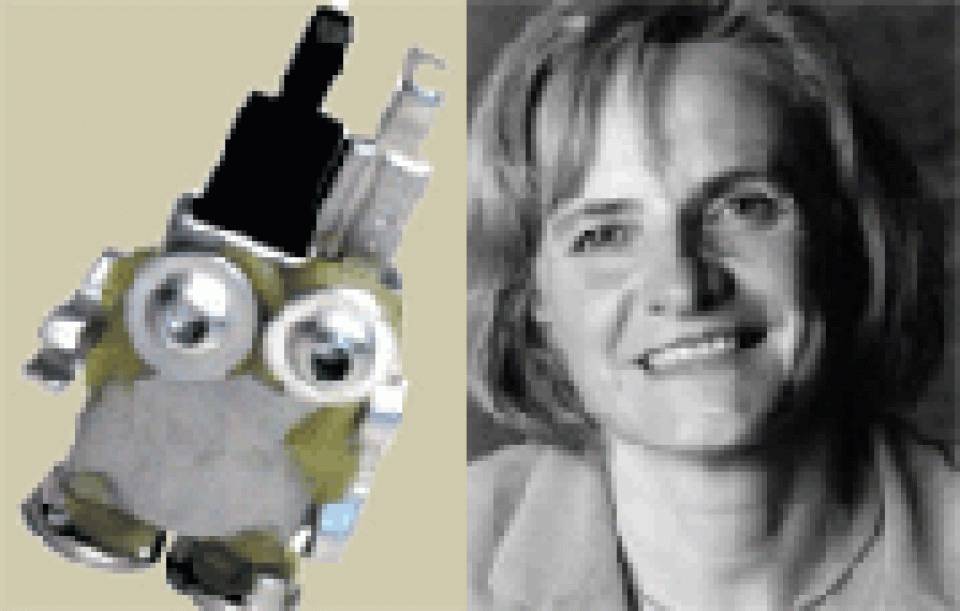
Prof. Dr. Heidi Schelhowe is a professor for “Digital Media in Education” at the Computer Science Department of the University of Bremen. Her special field of research and teaching is application of Digital Media in schools as well as in university teaching, Computers and Society and Gender Questions in Computing Sciences. Interaction and interactivity are main concepts in her research and teaching, plus the constant efforts to create interesting and provocative gender aware knowledge environments. She initiated the virtual ifu (vifu) or the Virtual International Community of Women’s Scholars project, which looked at the connections between the processes of content and technology production from a gendered perspective. Jac sm Kee speaks with this seminal thinker, educator and technologist about gendered dimensions of software, robots and creating transformative pedagogic environments.
Jac: To start with, could you tell me a little about your capacity, your areas of interest, and what you are working on right now?
Heidi: I finished a teacher's, as well as a computer science study program and did my PhD in computer science. I am a Professor of Digital Media in Education at the Computer Science Department at the University of Bremen, and head of a research group of about 15 people doing all research and teaching in the field. We are an interdisciplinary team: pedagogists, designers, sociologists and computer scientists. Our fields of research are developing software for educational contexts (children, university teaching, women especially, arranging learning environments and evaluation.
Jac: That sounds like a great team! How did you get interested in digital media and computer science in the first place? Is it a common area of study in your context?
Heidi: Yes, it is a common area. I teach classes of computer science students and digital media students in how design software for educational contexts (part of "application") and also teacher students in a basic understanding of digital media.
Jac: How is the educational environment there? Especially in terms of girls and women in the field of ICTs?
Heidi: In the programme called "digital media", we have one third of women. In computer science, about 18 percent. This is a rather high percentage for Germany. We achieve this level of participation because we have a couple of special programmes like “Girl's Day” and "Informatica Feminale" that attract girls. Also, maybe our high valuing of "application" and social responsibility inside the curriculum plays a role in attracting more women.
Jac: That's wonderful! I want to talk to you more about that later, in terms of creating a gender-aware pedagogic environment. But first, can you tell me what are the reasons for having these special programmes? What are the needs that it is trying to address?
Heidi: The special programmes are needed because often women and girls don't feel attracted to a technological culture. They feel that it is boring to sit in front of computers, and they don't feel welcome at technical faculties. So with the special programs, we want to give them the feeling that it is an interesting topic, and that they can feel welcome.
Jac: I see. In your opinion, especially since the World Summit on Information Society (WSIS), has there been a growing emphasis by the State to connect ICTs with education?
Heidi: No. We had a high emphasis on information technologies for education during the last years. Now this is sometimes questioned, and some members of the public and also in the government think that one should turn more attention to traditional fields of education. WSIS didn't have any influence on the German discussion, I feel.
Jac: So what do you think? Is it an over-emphasis on the role of technology in society when it comes to education? Or more like a question of discourse around technology? In Malaysia, where I am from, there is a lot of talk about 'knowledge societies', 'e-societies' etc., but no real understanding on the social or human dimension of technology.
Heidi: The over-emphasis has been on matters of skills and on learning how to use technology in my opinion. Less attention has been given to the fact that the world, the conditions for growing up, the culture and all the communication structures have changed through and together with information technologies. We have to put more attention to that, also in the field of education.
Jac: Why is that?
Heidi: That's all the same in Germany! Education really means to understand it's own being in the world and to get an understanding of the changes and to find one's own place in it and to become empowered and able to participate in designing the own and the world's future. That's the crucial role also in understanding technology and its potentials
Jac: But you tend to find that now education is all about skills instead?
Heidi: Yes, too much! Skills are best gained when you have urgent needs and you really want to do something with technology or/and when you know that technology will open new possibilities for you to develop, to communicate, to understand. In our context we ask students to bring their own imagination, ideas and projects with them. Then we support them to find suitable technologies to realise their projects and we help them to gain the necessary skills.
Jac: I agree to your point about urgent needs. I find that that is usually one of the alienating factors for women or girls to be interested in technology, because there seem to be little relevance in the lives, perhaps related to gendered expectations. Tell me a little about some of the work you are involved with. Especially the Roberta project, it sounds very interesting!
Heidi: Yes, I also liked that project. It has been so encouraging for girls and they could gain a lot of knowledge out of it in order to regard themselves as technology designers. The Roberta project involved more than 1000 girls were involved in workshops all over Germany, building and programming robots with Lego Mindstorms. This project was conducted by the Fraunhofer Gesellshcaft and we did the scientific evaluation. The workshops took place in schools, museums, libraries... even after short time workshops we found out that the girls could imagine themselves much more then before as becoming a "computer expert". At the Roberta project, we also discovered another crucial point: the materials themselves are often "gendered". That makes an important point for ourselves as computer scientists: we have to become more aware of what we are doing. Software is by no means neutral.
Jac: In what way did you find that the software was "gendered"? What were the implications?
Heidi: The instruction papers of Lego Mindstorms, which is aimed for children, provide directions on how to build cars. So that was really a matter where mostly boys were interested in. We worked with the teachers on a didactical concept that oriented more on building creatures, like animals... Not only the girls, but also boys (we observed this in some of the mixed groups) liked this even more then building cars, and the gender behaviour became much less obvious. This effect comes not only in the hardware, but also the programming environment that is implemented to foster programming of car movements. At the moment, we are working on a new programming environment for children that includes more communication and exchange of programming concepts.
Jac: In this sense, it does seems like both the hardware and the logic that accompanies it have an implication on gender expectations and the accessibility of the material or progress for those involved.
Heidi: Yes, indeed. By the way, Roberta goes to Europe now. The concept is now spread to Europe via a European Union funded project.
Jac: That is wonderful! You mentioned earlier about creating a gender-aware pedagogic environment. Can you tell me a little more about that? What it means, how do you try to shape that kind of context in your work?
Heidi: In my research group work, there are more women than men. We observe that women students are especially attracted to work with us, to visit our courses, to write their diploma theses with us. To see female researchers in the field of computer science is an important issue for students. Another point is that in our projects, we always work with users (children, secretaries etc.) from the first step on. We involve them in our software design from the first day in a participatory development process. That is also a point that women like to see – and is also a very important matter in designing good software – that you deal with people, not only with machines, when you become a computer scientist
Jac: Why is it an important issue to see female researchers in the field of computer science?
Heidi: Female computer scientists are role models. We can show that technology is not (only) a thing for ‘unattractive’ boys, but that you can be a women at the same time as being a dedicated technologist.
Jac: :) And what do you think about the idea recently implemented where women techies pose in sexualised classic movie posters to break that similar perception? It's quite a funny idea. http://www.itgoddess.info/
Heidi: Aha, interesting.
Jac: :) Anyway, that was a little off the point. What kind of state support do you feel is available for the kind of work that you do? In terms of research funding, module development, project implementation, infrastructure etc?
Heidi: There is some state support in matters of research funding and their is also a group of government people concerned about the question of winning more women for technology.
Jac: Is it adequate?
Heidi: Sure, we could need more support!
Jac: :) Is there good gender awareness on the government on issues of gender and technology in education? For example, can they appreciate your work on highlighting and working with the gendered dimensions of software?
Heidi: As I mentioned earlier, by some people yes, others no. We got some funding for this question. But the question should become more public, indeed! Most people think that technology is some kind of neutral thing.
Jac: Yes... Why do you think it is important to think about ICTs and education from a gender perspective? Especially in terms of achieving gender equality at large?
Heidi: There are two main reasons: 1) it is a question to be part of those who have the power to having a say on how our future will look like; 2) it is a matter of losing the one half of the world's creativity for ICT design!
Jac: A very good reason. So you mean ICTs has a large role to play in our future?
Heidi: Yes!!! Information technologies shape workplaces, culture, communication, every day life, the subjects and its self awareness.
Jac: Even in places where there is low connectivity or access to technology?
Heidi: Even there, and often in the bad way: they become excluded.
Jac: That is true, and then excluded subjects are named and defined without their participation or perspectives or voice or presence. There is a complaint by some parties about the over-emphasis on ‘new’ ICTs, and ignoring the development of more 'traditional' ones like radio and print media.
Heidi: In modern media, ‘traditional’ media become part of information technologies as ‘digital media’. The digital medium encompasses all the other media more and more, and changes their forms. Cellular phones are wide spread in a lot of regions. They have the capacity to be two-way media that can give all people a voice.
Jac: And as such, maybe it is simply a matter of differentiating definitions that is in effect, not really relevant anymore.
Responses to this post
I want do p.H.D. what is procedure & criteria plz forward all detais to me
- Add new comment
- 6811 views






Add new comment